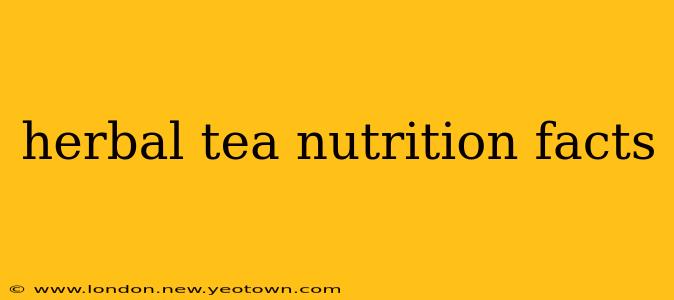Herbal teas, unlike traditional teas derived from the Camellia sinensis plant (black, green, white, and oolong), don't contain caffeine and boast a wide array of potential health benefits. But what exactly are those benefits? And what's the nutritional profile of these comforting beverages? Let's unravel the mysteries surrounding herbal tea nutrition facts.
What are the nutritional benefits of herbal tea?
The nutritional content of herbal tea varies greatly depending on the herbs used. Many herbal teas are low in calories, virtually calorie-free, and don't contribute significant amounts of macronutrients like carbohydrates, protein, or fat. However, their real nutritional value lies in the abundance of micronutrients and bioactive compounds they contain. These compounds, such as antioxidants, polyphenols, and vitamins, are what often contribute to their potential health benefits.
Does herbal tea have any vitamins or minerals?
While not a significant source of vitamins and minerals in the way fruits and vegetables are, some herbal teas can provide trace amounts of these vital nutrients. For instance, chamomile tea might contain small amounts of Vitamin C, while hibiscus tea can offer some iron. However, it's crucial to understand that relying solely on herbal tea for your vitamin and mineral intake would be insufficient. These teas should be considered a complementary addition to a balanced diet, not a replacement.
What are the health benefits of different herbal teas?
The health benefits associated with herbal teas are as diverse as the herbs themselves. Let's explore some examples:
- Chamomile: Known for its calming properties, chamomile tea is often used to promote relaxation and sleep.
- Ginger: Ginger tea is frequently consumed to soothe upset stomachs and reduce nausea. Its anti-inflammatory properties are also noteworthy.
- Peppermint: Peppermint tea is popular for its refreshing taste and potential to relieve digestive discomfort, including bloating and gas.
- Hibiscus: This tart tea boasts antioxidant properties and may help lower blood pressure.
- Rooibos: A naturally sweet tea from South Africa, rooibos is known for its antioxidant content and potential benefits for skin health.
Is herbal tea good for weight loss?
Some herbal teas, like green tea (though technically not a true herbal tea), are often associated with weight loss due to their metabolism-boosting properties. However, there's no magic bullet for weight loss, and herbal teas should not be considered a standalone solution. A healthy diet and regular exercise remain crucial for effective and sustainable weight management. While some herbal teas might support weight loss indirectly, they don't directly burn fat or calories.
Is herbal tea good for your skin?
Certain herbal teas contain antioxidants and anti-inflammatory compounds that may benefit skin health. For example, rooibos tea is rich in antioxidants that protect against free radical damage, potentially contributing to improved skin complexion and reduced signs of aging. However, it's essential to remember that topical skincare products are still the primary way to address specific skin concerns.
Are there any side effects of drinking herbal tea?
While generally safe for consumption, herbal teas can sometimes have side effects depending on the individual and the type of herb. Some people may experience allergic reactions, while others might experience mild digestive upset. It's always recommended to start with small amounts to assess your tolerance and to consult a doctor if you have any underlying health conditions or are taking medication. Pregnant or breastfeeding individuals should also exercise caution and consult their healthcare provider before consuming herbal teas.
What is the best time to drink herbal tea?
The best time to drink herbal tea depends largely on your personal preference and the type of tea you're consuming. Chamomile tea is often enjoyed before bed due to its calming effects, while peppermint tea might be preferred after a meal to aid digestion. Ultimately, there's no universally "best" time; listen to your body and experiment to discover what works best for you.
This exploration into herbal tea nutrition facts reveals a world of subtle yet significant health benefits. Remember to approach herbal teas as a complement to a healthy lifestyle, not a quick fix for every ailment. As always, consult with a healthcare professional if you have any specific concerns or questions about incorporating herbal teas into your diet.

